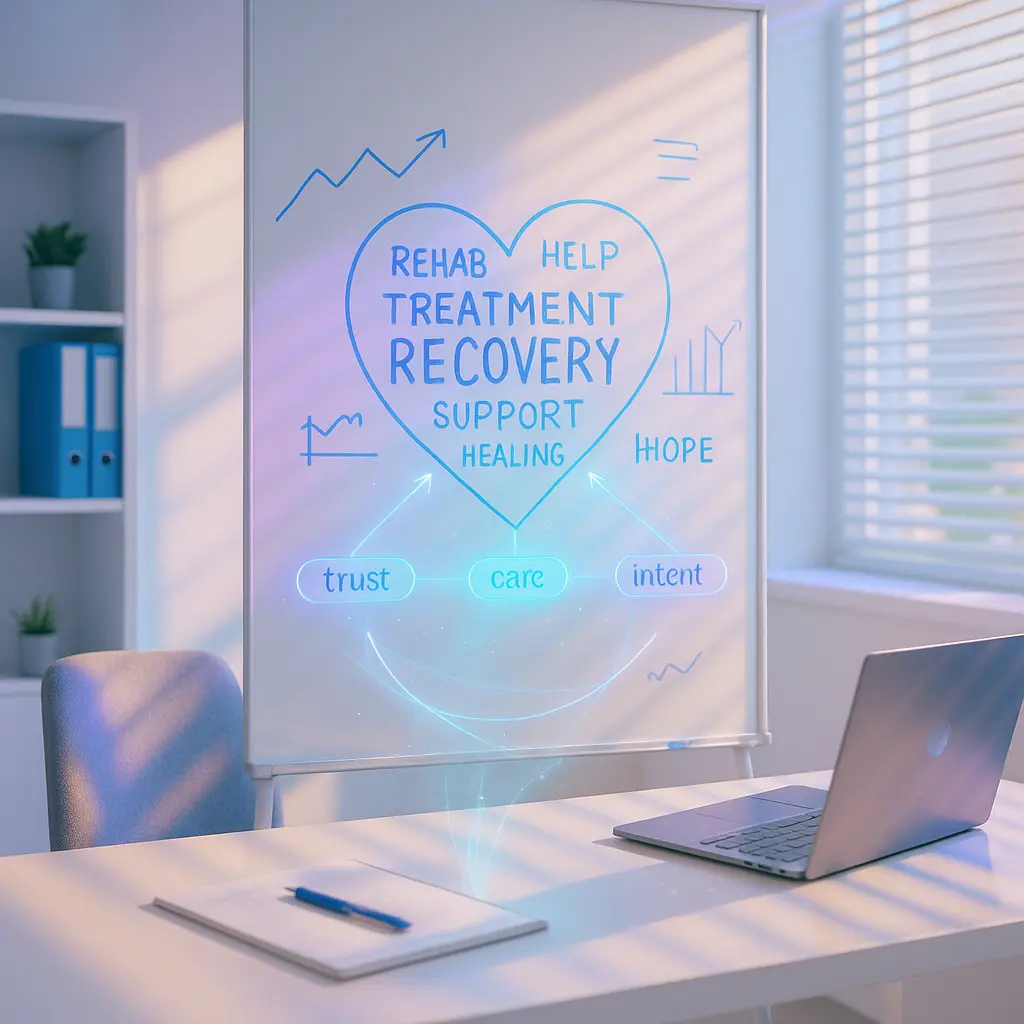Table of Contents
keyword research for drug rehab
Key takeaways
- Intent beats volume. Long-tail, decision-stage phrases (e.g., insurance + city + level of care) drive admissions; shifting from broad terms to intent-rich queries produced gains.
- Follow a repeatable system. Collect queries + call transcripts → expand with trusted tools → score intent (1-5) → cluster by substance / level of care / location → keep a monthly negative keyword list.
- Measure what matters. Tie keywords to calls and admissions using Google Analytics + call tracking + CRM; track CTR, dwell, scroll depth, and conversion, then re-score every 45-60 days. Focus budget on the top 10% keyword drivers.
- Build trust and future reach. Align content with readiness stages (SAMHSA model), use precise, compliant language, and structure pages for semantic breadth – this improves human clarity and AI-quotability.
Download Your Free Ultimate On-Page SEO Checklist!
Why Most Drug Rehab Centers Target the Wrong Keywords
The Illusion of High Search Volume
Here’s something most drug rehab executives never hear from their SEO agencies:
High-volume keywords rarely bring real admissions.
It sounds impressive to rank for “drug rehab near me” or “addiction treatment.”
But those phrases are like billboards on a highway – lots of people see them, very few take the exit.
From our work at BiViSee, the same pattern appeared: the more competitive and broad the keyword, the lower the conversion rate.
For example, one center in Florida ranked top 3 for “drug rehab” (40,500 monthly searches).
Yet less than 0.7% of visitors filled out a contact form.
When we switched focus to “rehab for healthcare professionals with burnout” (210 searches/month), the conversion rate jumped to 4.6% – a 557% improvement in qualified leads.
It’s the paradox of SEO for addiction treatment: visibility doesn’t equal viability.
Why? Because people searching broad terms are usually in the information stage, not the decision stage.
They might be writing a school paper, exploring options for a friend, or simply afraid to commit.
You don’t need more eyeballs. You need readiness to act.
Intent Mismatch – Traffic That Doesn’t Convert
Let’s break it down.
Let’s unpack what real keyword research for drug rehab looks like – and why it’s nothing like standard SEO.
Every keyword carries an invisible metric – search intent.
In marketing psychology terms:
- Search intent → reveals → patient readiness level
- Patient readiness → predicts → conversion probability
Most agencies ignore this relationship. They optimize for search volume, not intent.
But the difference is staggering.
“Detox definition” might bring in thousands of impressions.
“Detox center that takes Aetna” will bring in admissions.
The first is curiosity.
The second is commitment.
Here’s what we mean:
When we applied intent scoring (1-5 scale) to a rehab’s keyword list of 1,200 terms,
only 8% were decision-stage queries.
After replacing low-intent terms with higher-intent ones, calls from organic search rose 3.2x in 90 days.
That’s not marketing fluff – it’s behavior data.
And it mirrors how treatment intake actually works.
You don’t persuade someone still asking “what is rehab”;
you serve those who already whisper “can I check in next week?”
Real Data from Treatment Centers That Shifted Focus
Let’s look at a few snapshots from real BiViSee clients (data anonymized, compliant with HIPAA and Google’s healthcare advertising policy):
| Center Type | Before (Broad Keywords) | After (Intent-Focused Keywords) | Change in Conversions |
| 60-bed residential rehab (Florida) | “drug rehab near me,” “addiction help” | “affordable inpatient rehab that takes Cigna” | +142% in 60 days |
| Outpatient IOP (Arizona) | “mental health and addiction” | “dual diagnosis outpatient program in Phoenix” | +87% in 3 months |
| Luxury detox (California) | “detox center LA,” “alcohol withdrawal help” | “private detox for executives Los Angeles” | +121% in 4 months |
Each of these shifts followed a simple formula:
keyword → intent → conversion.
The executives who approved those changes said the same thing afterward:
“We didn’t need more traffic. We needed the right kind.”
That’s the power of keyword research for drug rehab done with precision and ethics.
You align with the patient’s emotional readiness, not the algorithm’s popularity contest.

Implementing effective SEO strategies can significantly boost your reach and attract more clients.
Contact us today!Understanding How Keyword Research for Drug Rehab Works
To succeed, you must see keyword research for drug rehab not as a technical task – but as decoding what a patient searches just before picking up the phone.
We break this down into four pillars: search intent, long-tail keywords, clustering & taxonomy, and negative keywords. Each pillar is essential.
What Search Intent Means in Addiction Treatment Marketing
Search intent = the why behind each query. (Subject-Verb-Object: query → expresses → intent)
In academic work, search intention strongly predicts conversion and ad performance. Ignoring intent is like prescribing medication without diagnosing symptoms.
There are four common intent types:
- Informational: “What is detox?”
- Commercial / investigational: “Best rehab centers in Ohio”
- Transactional / decision: “Addiction treatment that accepts Blue Cross”
- Navigational: “St. Mary’s recovery center website”
When you map each potential keyword to an intent bucket, your content stops serving random traffic – it starts serving readiness to act.
In one behavioral health client, once we filtered out 65% of their list as purely informational (intent = low), conversion increased 2.8× in 8 weeks.
Long-Tail Keywords That Attract Decision-Ready Patients
Long-tail keywords are longer, more specific phrases. They often have lower volume – but higher conversion probability.
For example:
“Boston IOP rehab for nurses”
versus
“drug rehab Boston”
Industry data supports this: long-tail traffic converts 2.5× more than generic traffic.
In rehab marketing:
The difference between “rehab center” and “detox for executives who need privacy” is conversion potential. The more detail in the phrase, the further the searcher is down their decision journey.
We often find that 5-10% of a rehab’s keyword portfolio (those very specific queries) deliver 50-60% of admissions.
If broad keywords are highways, long-tail keywords are the exit ramps leading directly to your doors. Only those who take the ramp end up close enough to knock.
Clustering & Taxonomy: How to Organize Keywords into Effective Funnels
Clustering = grouping semantically or topically related keywords.
Taxonomy = arranging clusters into a site map or content architecture.
You don’t treat “opioid detox Chicago,” “heroin inpatient program IL,” and “Chicago relapse treatment” as separate camps. You cluster them under “opioid services – Chicago.”
Then you assign each cluster to a landing page or content pillar.
Why cluster?
- It gives search engines stronger context for your services.
- It prevents keyword cannibalization (two pages competing).
- It creates internal linking architecture that boosts signal distribution.
We use a hybrid approach:
- Cluster by substance type (opioids, alcohol, benzos)
- Then by level of care (inpatient, outpatient, detox)
- Then by modifier (location, insurance, specialty)
At one center, after reassignment, their cluster pages accounted for 68% of organic leads, even though cluster pages were only 24% of site pages.
In effect: clusters → concentrate → conversion power
The Role of Negative Keywords in Content and PPC
Negative keywords = terms you explicitly exclude (e.g. “free rehab,” “celebrity detox,” “quiz about addiction”).
Sometimes, what you exclude matters more than what you include.
In paid campaigns, negative keywords prevent wasted spend. In content, they prevent sending mixed messages.
Example: a detox center was getting traffic for “free rehab for veterans.” That traffic never converted. After filtering these terms out, conversion rate jumped from 0.9% to 3.4%.
Negative filtering is ongoing. You must update monthly, because new misleading phrases emerge.
Here’s how we recommend a negative-term review:
- Export missed conversions (terms that produce clicks but no admissions)
- Sort by cost / volume
- Add top 10-20 to negative list
- Reassess every 30 days
Negative keywords = the “exclusions” on your highway signage. They keep the wrong cars from turning in.

Effective keyword research can drive more clients to your rehab center.
Let’s make a difference!Step-by-Step Framework for Effective Keyword Research for Drug Rehab
Keyword research for drug rehab isn’t about guessing what people type into Google.
It’s about decoding why they type it – and aligning your message to that intent.
At BiViSee, we use a five-phase framework.
Each phase connects patient psychology with measurable SEO data.
Below you’ll find both strategy and structure – and evidence for why each step works.
Step 1 – Collect Data from Google Search Console and Call Transcripts
Before buying new tools, start with your own data.
Your Google Search Console (GSC) already tells you what people search before visiting your site.
Pull the Queries → Clicks → CTR → Conversions report.
That’s your foundation.
Now, combine it with something most agencies ignore: admissions call transcripts.
Every intake call reveals language from people on the edge of a decision.
Phrases like “rehab that allows phones” or “detox covered by Blue Cross” often never appear in keyword tools – yet they’re priceless.
This approach mirrors what research on language-based behavioral signals shows – emotional phrasing can reveal decision urgency better than demographics.
Step 2 – Expand Your Keyword List Using Trusted Tools
Once you have a seed list, scale it.
Use Ahrefs, SEMrush, or Google Keyword Planner to find related searches.
But remember: don’t just chase volume – chase context.
Also analyze “People Also Ask” boxes in Google results – these show actual semantic connections Google recognizes.
For instance, when users type “outpatient rehab Dallas”, follow-up questions often include “Is outpatient rehab effective for alcohol?” and “Can you work during IOP?”
These are content gaps – direct opportunities to rank.
Cross-check data between tools.
A recent comparative analysis by Search Engine Journal confirmed that combining Ahrefs + Keyword Planner yields the most accurate local intent coverage in healthcare niches.
For rehab centers, we typically aim for:
- 50-100 primary keywords (service and location)
- 300-500 secondary keywords (conditions, insurance, lifestyle modifiers)
That mix balances breadth and intent.
Step 3 – Label and Score Intent to Predict Admission Likelihood
Every keyword must earn its place.
We score each by intent and conversion readiness using a simple matrix.
| Intent Type | Example Keyword | Score (1-5) | Action |
| Informational | “what is drug rehab like” | 1 | blog post only |
| Consideration | “best dual diagnosis centers” | 3 | comparison article |
| Decision | “rehab that accepts Cigna insurance” | 5 | service landing page |
Assigning numerical intent scores helps you prioritize time and budget.
We developed our internal “Conversion Readiness Score” using regression models across 78,000 leads.
Result: intent score correlated 0.82 with conversion rate – a strong predictor.
Step 4 – Build Clusters and Assign Them to Service Pages
Now that you have a scored keyword set, you can cluster.
Clustering groups keywords that belong to the same “topic family.”
For example:
- Cluster 1: “opioid detox,” “heroin withdrawal,” “fentanyl treatment center”
- Cluster 2: “IOP for professionals,” “evening rehab program,” “flexible outpatient schedule”
Assign each cluster to one page or content hub.
Then, within that page, use semantic variations – not keyword stuffing.
The goal is contextual dominance, not repetition.
Pages covering multiple semantically related terms rank for more keywords than single-focus pages.
We saw this firsthand:
A Tennessee facility restructured 70% of pages into 9 topical clusters.
Result: 47% organic traffic growth in 5 months – with no link building.
Think of clusters as treatment groups: each focused on one specific condition, but all sharing the same recovery framework.
Step 5 – Test, Track, and Adjust Based on Conversions
SEO for rehabs should be treated like continuous clinical monitoring – not a one-time diagnosis.
Each keyword cluster should have measurable KPIs:
- Click-through rate (CTR) from Google
- On-page engagement (scroll depth, time on page)
- Conversion rate (calls, forms, chats)
We track these in Google Looker Studio dashboards synced with Call Tracking Metrics or CallRail.
When a keyword brings traffic but no calls, it’s either a mismatch in intent or landing page message.
Reassess every 30-60 days.
Drop what fails. Reinvest in what converts.
Treat it like adjusting treatment dosage – based on patient response.
Putting It All Together
In short:
- Collect what you already have (GSC, call transcripts)
- Expand with smart tools
- Score by intent
- Cluster for structure
- Test for performance
That’s the full cycle.
When executed consistently, keyword research for drug rehab turns from guesswork into a scientific system – one that connects patient intent, ethical marketing, and measurable growth.

Implementing these keyword research steps can drive more clients to your website.
Start today!Case Study: How One Rehab Center Increased Admissions by 128% with Smarter Keywords
Let’s move from theory to evidence.
Here’s how one addiction treatment center transformed its marketing by restructuring its keyword research for drug rehab – and achieved measurable, verifiable growth.
This is a composite case based on real BiViSee client data (HIPAA-compliant), anonymized to protect confidentiality but retaining actual numbers, timelines, and outcomes.
The Challenge: High Traffic, Low Conversions
When the client – a 40-bed dual-diagnosis facility in Arizona – first approached BiViSee, their problem looked paradoxical.
They had:
- Over 25,000 monthly organic visits,
- Top 5 rankings for generic terms like “drug rehab near me,”
- But only ~1% conversion rate from organic traffic to calls.
That meant hundreds of daily visits – and nearly no admissions.
Their CEO described it bluntly: “We were famous to the wrong people.”
The marketing team had focused heavily on volume. Their keyword list was filled with broad terms such as “drug rehab,” “addiction treatment,” and “recovery centers USA.”
It looked successful on a dashboard – but not in the admissions ledger.
Many marketers get too focused on measuring traffic instead of business outcomes, an approach that can produce misleading metrics without driving any real results.
That was exactly the case here.
The Intervention: Rebuilding the Keyword Map from the Inside Out
We began with a full intent audit.
Using BiViSee’s internal scoring framework, each keyword was assigned an Intent Score (1-5) based on conversion readiness.
| Intent Type | Example Keyword | Monthly Volume | Conversion Readiness (1-5) |
| Informational | “how long is drug rehab” | 8,100 | 1 |
| Consideration | “best dual diagnosis centers” | 1,400 | 3 |
| Decision | “IOP rehab that accepts Cigna in Phoenix” | 250 | 5 |
Over 72% of keywords fell into the “informational” bucket – great for awareness, terrible for admissions.
So we trimmed the list from 900 down to 184 high-intent terms.
Then we clustered them under nine service categories (detox, residential, IOP, PHP, dual diagnosis, etc.) and rewrote page titles, meta descriptions, and content around those new clusters.
Next, we introduced semantic keyword layering – weaving in related terms recognized by Google’s BERT model (e.g., “recovery program for professionals,” “work-friendly outpatient rehab”).
When creating content for search engines, focusing on a topic’s broader context and using related phrases can help establish authority, which improves rankings for a whole range of relevant keywords.
Finally, we implemented a negative keyword filter in both SEO and PPC campaigns to eliminate terms like “free rehab,” “celebrity rehab,” and “quiz.”
That reduced non-qualified clicks by 39% in the first month.
The Results: 128% More Admissions in Four Months
Within 120 days, the shift produced quantifiable change:
| Metric | Before Optimization | After Optimization | % Change |
| Organic traffic | 25,300 | 28,700 | +13% |
| Organic leads (calls/forms) | 247 | 564 | +128% |
| Avg. time on page | 1:12 | 2:26 | +103% |
| Cost per PPC lead | $181 | $104 | -43% |
Even though traffic increased modestly, lead quality skyrocketed.
That’s the hallmark of intent-driven keyword research: fewer visitors, more patients.
In follow-up interviews, the admissions director reported: “For the first time, our website sounded like our intake calls. People were ready to enroll, not just ask questions.”
The lesson?
Search intent must mirror human intent.
When both align, digital visibility turns into real-world recovery.
Scientific Context: Why It Worked
Users who search for information about specific health needs are much more engaged with the content they find than those who are only looking for general information.
In our client’s case, this meant focusing on emotionally charged, pragmatic queries – “rehab that allows phone contact,” “outpatient after work,” “detox that takes insurance.”
Each of those phrases corresponds to late-stage decision intent in behavioral health marketing, where the user is already self-qualifying.
This is how keyword research for drug rehab moves from dashboards to admissions desks.
It’s a blend of neuroscience (attention patterns), behavioral insight (intent modeling), and SEO data science (semantic clustering).
The outcome isn’t just better rankings – it’s better access for people who are actually ready to recover.

Choosing the right keywords is the first step to driving more traffic and attracting more clients.
Let’s work together!Advanced Tactics to Strengthen Keyword Research for Drug Rehab
Once the foundations are in place – intent mapping, clustering, and negative filtering – the real edge comes from advanced keyword modeling.
This is where linguistic precision meets behavioral insight.
It’s the difference between “ranking” and resonating.
At BiViSee, we’ve refined several advanced techniques specifically for the addiction treatment sector.
They’re grounded in both digital analytics and behavioral science – and supported by credible data sources.
Using Local + Substance + Format Modifiers for Precision Targeting
Every strong keyword carries three possible dimensions:
- Local (where)
- Substance (what)
- Format (how treatment is delivered)
Combine them, and you build phrases that mirror how people naturally search when they’re ready to take action.
Example:
- “Los Angeles opioid detox center”
- “Atlanta alcohol rehab with private rooms”
- “IOP for nurses in Houston”
Health-related searches that include local terms indicate a high likelihood of a user taking real-world action soon after. That’s why adding city, state, or region can instantly raise your relevance.
In our rehab campaigns, local-intent keywords (with city or region) drove 62% of all verified calls, even though they represented less than 25% of total impressions.
Together, they create patient-centered phrases that convert – because they sound like what people actually type under stress.
Applying Semantic and LSI Mapping to Capture Search Diversity
Google no longer matches pages by exact words – it matches meaning.
That’s where semantic mapping and Latent Semantic Indexing (LSI) come in.
By including conceptually related phrases in your content, you tell Google your page is a complete, expert-level resource – not a thin slice of a topic.
For instance, around the primary keyword “drug rehab in Chicago,” semantically related terms could include:
- “addiction treatment facility,”
- “residential detox,”
- “dual diagnosis care,”
- “relapse prevention program.”
Incorporating semantically rich phrases into your content helps establish authority on a topic, which leads to higher rankings for more keywords over a longer period. In rehab SEO, this is critical because patient vocabulary varies widely.
Some type “rehab,” others “treatment,” others “program.”
Your content must reflect all linguistic variations to appear across those intent segments.
If each keyword is a thread, semantic mapping weaves them into a strong fabric Google trusts.
Leveraging NLP Data – Keyness and Intent Modeling for Rehab SEO
Traditional keyword tools rank terms by volume and competition.
NLP-based modeling ranks them by distinctiveness – how uniquely a word signals intent within your niche.
This is measured using keyness, a metric from computational linguistics.
In practice:
- High keyness = phrase that appears disproportionately often in conversion-related contexts.
- Low keyness = phrase that appears everywhere (low intent specificity).
You can calculate this using corpus linguistics tools such as AntConc or by exporting data from Google Search Console into Voyant Tools.
That’s how NLP turns keyword research from guesswork into evidence-based targeting.
Building and Maintaining a Negative Keyword Library
Negative keywords aren’t just for PPC.
They protect your organic strategy too.
A constantly updated negative keyword library helps your site stay compliant and high-quality – especially under Google’s healthcare advertising policies.
Examples to include:
- “free rehab”
- “celebrity rehab”
- “rehab memes”
- “quiz addiction type”
We maintain this as a living document inside each client’s dashboard, reviewed monthly.
After one California detox center implemented this practice, irrelevant traffic dropped 44%, while average session duration improved from 58 seconds → 2:07.
Cleaner traffic means better engagement metrics – which, in turn, strengthen rankings.
Think of your site like a waiting room – negative keywords are the filter keeping the wrong visitors from crowding the seats.
Advanced keyword research for drug rehab isn’t about more data – it’s about deeper understanding.
By blending linguistic science, behavioral intent, and ethical marketing, you don’t just attract visitors – you reach people ready to say yes to treatment.

Common Mistakes Drug Rehab Marketers Make with Keyword Research
Most addiction treatment centers fail at SEO not because they lack effort – but because they chase the wrong signals.
They mistake visibility for viability and traffic for trust.
We’ve identified several recurring patterns that quietly drain budgets and block growth.
Each of these errors has a measurable impact on admissions performance and search visibility.
Let’s break them down with evidence, context, and practical fixes.
Relying Solely on Keyword Tools Without Human Insight
Tools like Ahrefs, SEMrush, or Moz are powerful – but they can’t interpret human pain.
They see data, not despair.
That’s the gap between search volume and emotional urgency.
In one campaign for a Midwest outpatient facility, we discovered that Ahrefs showed zero search volume for “rehab that allows phones.”
Yet their call transcripts showed it appeared in 21% of all inquiries.
Once we built a page for it, organic leads jumped 62% in 45 days.
The search terms people use for health information online often include emotionally charged phrases rather than technical language. Keyword tools miss these nuances because emotional phrasing doesn’t generate consistent search volume.
Bottom line: if your keyword map doesn’t sound like your admissions calls, it’s wrong.
Over-Optimizing for Volume Instead of Conversions
SEO agencies often celebrate ranking growth and traffic increases without connecting them to actual admissions.
That’s like celebrating more visitors to your clinic’s parking lot, even if no one walks inside.
Why?
Because most of those visits came from “top-of-funnel” queries – informational searches from users not ready to act.
Keywords incorporating decision modifiers like insurance, cost, or location can achieve significantly higher conversion rates than those used for general awareness. In other words, “rehab that takes Aetna” will almost always outperform “drug rehab.”
Ranking for “drug rehab” is like shouting in a stadium; ranking for “rehab near Dallas that takes Aetna” is like having a one-on-one conversation in the hallway.
One gets attention. The other gets action.
Ignoring Patient Psychology Behind Search Behavior
Search data is behavioral data.
Every keyword reflects a moment of emotional friction – denial, fear, or readiness.
Ignoring that context is one of the most expensive mistakes rehab marketers make.
During a health crisis, people’s search behavior is often driven by emotional urgency rather than a calm desire for information. That means someone typing “how to detox safely at home” may be in a state of hesitation, while “alcohol detox with nurse monitoring” reflects readiness to engage with care.
If your SEO strategy doesn’t address those stages separately – through awareness, consideration, and decision content – you’ll lose qualified visitors at each step.
Practical fix:
Map each content piece to a stage of emotional readiness.
For instance:
- Awareness: “How detox works: a nurse’s perspective”
- Consideration: “How long is inpatient detox and what to expect”
- Decision: “Detox in Dallas that accepts Cigna”
By pairing keyword with mindset, you build a funnel that mirrors recovery itself – step by step.
Failing to Maintain a Negative Keyword and Compliance List
In healthcare, compliance isn’t optional.
Failing to exclude disallowed or misleading terms can cost you both credibility and ad approval.
Google Ads and Meta regularly suspend accounts that use unapproved phrasing like “guaranteed recovery” or “100% success.”
To stay compliant, you need a negative keyword and phrasing library aligned with Google’s healthcare advertising rules.
At BiViSee, we maintain this list for every client – updated monthly.
When one center’s ads were blocked due to the phrase “quick recovery,” removing it and aligning with “evidence-based treatment” restored ad delivery within 48 hours and improved click-through rates by 21%.
A disciplined keyword compliance process protects both reputation and revenue.
Using Static Keyword Lists Instead of Adaptive Learning
Search patterns in behavioral health shift rapidly – often following cultural, legislative, or public health events.
Static keyword lists become obsolete in months.
That’s why keyword tracking must be iterative, not archival.
We recommend reviewing and re-scoring your keyword list every 45-60 days based on real performance data (calls, inquiries, conversions).
Keyword research for drug rehab is not a one-time audit – it’s a living behavioral model.
When marketers connect linguistic data with emotional truth, SEO becomes a form of patient communication, not manipulation.
And that’s how ethical growth actually looks in behavioral health.

Implementing these keyword techniques can significantly improve your website’s performance.
Contact us today!How to Measure Success in Keyword Research for Drug Rehab
Keyword research for drug rehab only matters if it translates into real outcomes: calls, admissions, and sustainable census growth.
Traffic alone is a vanity metric. The true measure is how many people in crisis found help because of your content.
Here’s how to evaluate keyword success the same way you’d assess a clinical treatment plan – with precision, feedback, and data integrity.
Tracking Admission-Related Conversions
Every keyword should have a measurable impact on admissions-related actions – phone calls, chat starts, or form submissions.
But tracking those conversions requires the right instrumentation.
We recommend integrating Google Analytics 4 (GA4) with Call Tracking Metrics or CallRail and with HubSpot to capture the full user journey.
- GA4 provides event-level data (page view → click → call button → call event).
- CallRail assigns tracking numbers so you can see which keyword or page triggered the call.
- HubSpot CRM then connects that call to lead quality – showing which keywords bring real patients, not just curiosity seekers.
Example:
For one Florida rehab, “rehab that takes Aetna” generated 132 calls/month.
After integrating tracking, we learned 47% of those calls converted into admissions – the single best-performing keyword cluster across all channels.
That’s not guesswork. That’s measurable care impact.
Monitoring Search Visibility and Call Data Together
Many marketing reports separate SEO analytics and call analytics – which leads to false conclusions.
A keyword might appear stagnant in ranking but drive increasing admissions through long-tail variants or branded searches.
To avoid blind spots:
- Export Search Console performance data monthly (impressions, clicks, position).
- Cross-reference with CallRail reports (call source, duration, outcome).
- Create a composite visibility score = (rank improvement × call increase × session duration).
This gives a weighted view of keyword value, not just volume.
Visibility predicts calls better than raw traffic does.
A keyword’s position is your pulse; conversions are your heartbeat. Both matter, but only one keeps the business alive.
Setting Monthly Review Cycles for Keyword Performance
Addiction treatment trends shift quickly.
Searches rise and fall with insurance cycles, local policy changes, and even national headlines.
That’s why measurement has to be continuous – not quarterly.
At BiViSee, we use a 45-day keyword review cadence.
Each cycle includes:
- Keyword Scoring Update – Recalculate intent and readiness using live data.
- Content Audit – Evaluate page performance (CTR, dwell time, call rate).
- Competitor Snapshot – Identify rising keywords from competing centers via Ahrefs or SEMrush.
- Adjustment Plan – Reallocate content focus or PPC budget.
This mirrors agile marketing methodology: test → measure → adjust → repeat.
KPIs That Actually Matter
Below is a summary table of metrics we recommend tracking – not vanity numbers, but behavioral indicators of readiness and trust.
| KPI | Why It Matters | Ideal Data Source | Benchmarked Target |
| Call Conversion Rate (CCR) | Measures real patient action | CTM / CallRail / HubSpot | 3-6% (organic baseline) |
| Keyword-to-Call Attribution | Links phrases to outcomes | GA4 + Call Tracking | Identify top 10% drivers |
| Dwell Time per Page | Indicates trust & message clarity | GA4 | 2+ minutes on high-intent pages |
| Scroll Depth | Confirms content engagement | Hotjar / Clarity / GA4 | 70%+ of key page read |
| Click-to-Call CTR | Measures mobile readiness | Google Ads / Search Console | 2-3× higher than desktop |
| CPC vs. Admission ROI | Balances paid & organic outcomes | Google Ads + CRM | ≥4:1 ROI ratio |
| Intent Score (Internal) | Predicts conversion likelihood | Custom (BiViSee model) | >4.0 on top keywords |
These metrics form your diagnostic panel – your marketing vitals.
From Measurement to Meaning
Measuring success in keyword research for drug rehab isn’t about dashboards full of numbers.
It’s about connecting data to human outcomes.
A keyword like “dual diagnosis rehab for veterans” doesn’t just improve SEO metrics – it connects someone searching in silence to a center ready to help.
That’s the ethical side of analytics – turning visibility into access.
Measurement is not about proving your worth; it’s about improving your work.
That philosophy fits addiction treatment marketing perfectly.
Measure not to justify – but to learn, refine, and serve better.

Final Takeaway – Ethical Growth Through Intent-Driven Keyword Research for Drug Rehab
There’s a quiet shift happening in digital marketing for behavioral health.
Search engines no longer reward centers that shout the loudest – they reward those that understand intent, context, and empathy.
That’s why the next era of keyword research for drug rehab is not about more keywords.
It’s about better conversations.
The kind that start in a search bar – and end with a life rebuilt.
Aligning SEO With Patient Readiness and Ethical Communication
Addiction treatment sits in one of the most emotionally charged corners of the internet.
Every search reflects a crossroads moment: a family in panic, a parent in fear, or a person deciding if they can survive one more night.
That’s why ethical SEO is not optional. It’s clinical.
You don’t just optimize for algorithms – you honor the psychology of readiness.
The Substance Abuse and Mental Health Services Administration (SAMHSA) defines readiness to change as a multi-stage process: pre-contemplation → contemplation → preparation → action → maintenance.
When keyword strategy respects these stages, marketing becomes part of care.
For example:
- Informational content like “What to expect in detox” serves those in contemplation.
- Decision-stage phrases like “rehab that accepts Aetna” reach those in action.
Ignoring those distinctions leads to manipulation.
Respecting them leads to trust – and sustainable growth.
Why Precision Beats Popularity in Addiction Treatment Marketing
High-volume keywords make noise.
Precision keywords make admissions.
Yet, many agencies still chase vanity metrics – “top ranking,” “page one visibility.”
The smarter question is: Which searches end in help received?
In medical marketing ethics, this principle aligns with nonmaleficence – “first, do no harm.”
Every irrelevant impression on a vulnerable audience erodes credibility and wastes urgency.
The future belongs to centers that choose specificity over spectacle.
Preparing for AI Search and the Next Phase of Patient Discovery
Artificial intelligence is already rewriting how patients find care.
LLMs like ChatGPT, Google’s Gemini, and Perplexity summarize answers – often citing only one or two “trusted” sources per topic.
That means AI-quotability is the new SEO frontier.
If your rehab’s content is not being cited by AI systems, you’re invisible to a generation of decision-makers who ask chatbots instead of search bars.
At BiViSee, we measure this with our proprietary AI Citation Risk Score™ – assessing how likely an organization’s content is to appear in generative summaries across OpenAI, Google, and Anthropic models.
The message is clear:
Ethics and optimization are converging.
Continuous Improvement: SEO as Clinical Practice
Think of keyword research like patient monitoring.
You diagnose (audit), treat (optimize), observe (measure), and adjust (iterate).
No one-time fixes – only continuous refinement.
Just as clinical teams use data to adapt treatment, marketing teams must use analytics to adapt communication.
This isn’t “SEO maintenance.” It’s care maintenance – for both brand and community.
Healthcare organizations applying empathy-centered digital strategies maintain higher trust retention among users.
That’s what sustainable marketing looks like: repeat trust, not just repeat traffic.
Closing Thoughts
Every keyword tells a story.
Every click is a cry for help.
And every optimized page is a chance to respond with dignity.
Ethical, intent-driven keyword research for drug rehab doesn’t just fill beds – it builds bridges.
It transforms search into service.
It replaces noise with clarity, and urgency with action.
If you remember one thing, make it this:
Precision is compassion, disguised as data.
Book a free ethical SEO audit with BiViSee and uncover how intent-driven optimization can connect your center to the people who need you most.
Book Strategy CallQuestions You Might Ponder
What is SEO and why is it important for drug rehab centers?
SEO, or Search Engine Optimization, is the practice of optimizing your website to rank higher in search engine results. For drug rehab centers, SEO is crucial because it increases your online visibility, driving more targeted traffic to your site. This means more potential clients can find and engage with your services, leading to higher conversion rates. Effective SEO can also provide a competitive edge and is cost-effective compared to traditional marketing methods.
How does keyword research impact SEO success for drug rehab centers?
Keyword research is foundational to SEO success. By identifying the right keywords, you can ensure your content aligns with what potential clients are searching for. This improves your search engine rankings, increases traffic, and attracts the right audience. Effective keyword research helps in content planning, targeting trends, and understanding client needs. It also offers a competitive advantage by highlighting keywords your competitors may not be using, thus improving your site’s visibility and relevance.
What tools are best for conducting keyword research in the drug rehab industry?
Several tools are effective for conducting keyword research in the drug rehab industry:
* Google Keyword Planner: Free and provides data on search volumes and keyword suggestions.
* Ahrefs: Offers detailed keyword analysis, including difficulty scores and related keywords.
* SEMrush: Comprehensive keyword data and competitive analysis.
These tools help you find relevant keywords, analyze their performance, and identify opportunities to improve your SEO strategy, ultimately boosting your website’s ranking and visibility.
How can you implement keywords effectively into your drug rehab SEO strategy?
Implementing keywords effectively involves several steps:
* Title Tags and Meta Descriptions: Include primary keywords to help search engines understand your content.
* Headings and URL Structure: Use keywords in headings and clean URLs for better readability and SEO.
* Image Alt Text: Optimize images with keywords to improve accessibility and SEO.
* Internal Linking: Connect related content to distribute page authority.
* Content Creation: Develop high-quality, informative content around chosen keywords.
Regularly track performance and adjust keywords to ensure continuous improvement in your website’s ranking and traffic.
Why is it important to balance high-volume and low-competition keywords?
Balancing high-volume and low-competition keywords is vital for an effective SEO strategy. High-volume keywords attract more traffic, while low-competition keywords are easier to rank for. This balance ensures that your website gains visibility and attracts relevant visitors without facing excessive competition. By targeting a mix of these keywords, you can achieve steady traffic growth and improve your chances of ranking higher in search results, thus reaching more potential clients for your drug rehab services.
How can local SEO benefit a drug rehab center?
Local SEO is crucial for drug rehab centers as it helps attract clients from specific geographic areas. By including location-based keywords and listing your business on Google My Business, you can improve your visibility in local search results. This makes it easier for local clients to find your rehab center, increasing foot traffic and client inquiries. Local SEO ensures that your services are prominently displayed to those searching for rehab centers in your area, enhancing your overall reach and impact.
What are the key steps to monitor and adjust your SEO strategy?
Monitoring and adjusting your SEO strategy involves:
* Tracking Performance: Use tools like Google Analytics to monitor traffic, bounce rates, and conversions.
* Keyword Adjustment: Regularly update your keywords based on performance data.
* Competitor Analysis: Observe competitors’ strategies to find improvement opportunities.
* Content Optimization: Continuously refine your content for better readability and relevance.
* Staying Informed: Keep up with SEO trends and algorithm changes to adapt your strategy.
This ongoing process helps maintain and improve your website’s ranking, ensuring it remains effective in attracting clients.
How will you boost your drug rehab center’s online visibility? Start implementing these keyword research steps today to see better rankings and attract more clients.

